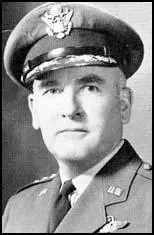Charles Cabell

Charles Cabell was born in Dallas County on 11th October, 1903. He graduated from West Point Military Academy in 1925. He also studied at the Command and General Staff School (1940) and the Army and Navy Staff College (1943).
During the Second World War Cabell was was a member of the advisory council for the United States Army Air Force headquarters in Washington before being made commander of the Forty-fifth Combat Wing of the Eighth Air Force in the Europe. He also served as Director of Plans (December, 1943 - April, 1944), Director of Operations and Intelligence Mediterranean Allied Air Forces (July, 1944 - May, 1945) and attended the Yalta Conference in February, 1945.
After the war he was the United States air representative on the military staff committee of the United Nations in New York. In 1951 he was appointed director of the staff for the Joint Chiefs of Staff, where he worked under General Omar Bradley. In 1953 he was appointed deputy director of the Central Intelligence Agency. In this job he was involved in organizing the Bay of Pigs invasion. It is also believed that Cabell was involved in developing plans to assassinate Fidel Castro.
His brother Earle Cabell was elected mayor of Dallas in May 1961. He therefore was involved in planning the trip John F. Kennedy made to Dallas on 22nd November, 1963. James H. Fetzer believes that the brothers were involved in the plot to kill Kennedy: "The two combined motive, means, and opportunity."
Cabell retired as a four-star general in 1963 and later became a consultant to the National Aeronautics and Space Administration.
Charles Cabell died in Arlington, Virginia, on 25th May, 1971.
Primary Sources
(1) Jim Garrison, On the Trail of the Assassins (1988)
General Charles Cabell was the brother of Earle Cabell, former mayor of Dallas. Now the eleventh-hour change in the President's motorcade route was even more intriguing to me, and I immediately headed for the public library. Before sunset I had become the leading expert in New Orleans on General Charles Cabell, who, it turned out, had been fired as the C.I.A.'s number two man by President Kennedy. General Cabell had been in charge of the Agency's disastrous Bay of Pigs invasion. In the final hours, while Castro's small air force was tearing the landing effort apart, Cabell had managed to get through a call to President Kennedy in an attempt to halt the disaster. Just over the horizon, by something less than happenstance, lay aircraft carriers with fighter planes on their decks, engines warming, up. General Cabell informed the President that these fighters could reverse the course of disaster in minutes and secure the success of the invasion. All that was needed was the President's authorization.
On the preceding day Kennedy had assured the assembled media that if anyone invaded Cuba (and the air had become rife with invasion rumors) there certainly would be no help from the U.S. armed forces. He flatly turned Cabell down. With that the invasion's chances sank, as did the general's intelligence career. President Kennedy asked for Cabell's resignation and the general was subsequently replaced on February 1, 1962, as the C.I.A.s deputy director. General Cabell's subsequent hatred of John Kennedy became an open secret in Washington.
In most countries, a powerful individual who had been in open conflict with a national leader who was later assassinated would receive at least a modicum of attention in the course of the posthumous inquiry. A major espionage organization with a highly sophisticated capability for accomplishing murder might receive even more. Certainly a powerful individual who also held a top position in a major espionage apparatus and had been at odds with the departed leader would be high on the list of suspects.
However, General Cabell, who fit that description perfectly, was never even called as a witness before the Warren Commission. One reason may have been that Alien Dulles, the former C.I.A. director (also fired by President Kennedy), was a member of the Commission and handled all leads relating to the Agency. During the nine years that Dulles had been the CIA's chief. General Charles Cabell had been his deputy.
(2) James H. Fetzer, Assassination Science and the Language of Proof, included in Assassination Science (1998)
The Deputy Director for Operations at the time of the Bay of Pigs invasion was an Air Force Lt. General by the name of Charles Cabell. Cabell had overseen attempts by the CIA in collusion with the Mob - which wanted to regain its casinos and resorts in Havana, where it was running the largest money-laundering operation in the Western hemisphere - to take out Castro. It was Cabell who, in the presence of Dean Rusk, called JFK to plead with him for the close air support he believed the President had promised, but which JFK refused to provide. He would later return to the Pentagon, after being relieved of his position at the CIA by JFK, where he would describe the President as a "traitor".
Charles Cabell was born in Dallas in 1903. His brother Earle was born near Dallas in 1906. In 1961, Earle Cabell became Mayor of the City of Dallas. In his capacity as Mayor, he not only supervised the police department but oversaw ceremonial activities, including parade routes and motorcades. There is no way that the Presidential motorcade could have taken the peculiar and improper route it took through Dealey Plaza - which even contradicted the route published in the morning paper - without the approval of the Mayor. The two combined motive, means, and opportunity. The psychodynamics of the assassination, as I reconstruct the crime, thus appear to have pitted two rich and powerful right-wing brothers against two rich and powerful left-wing brothers.

